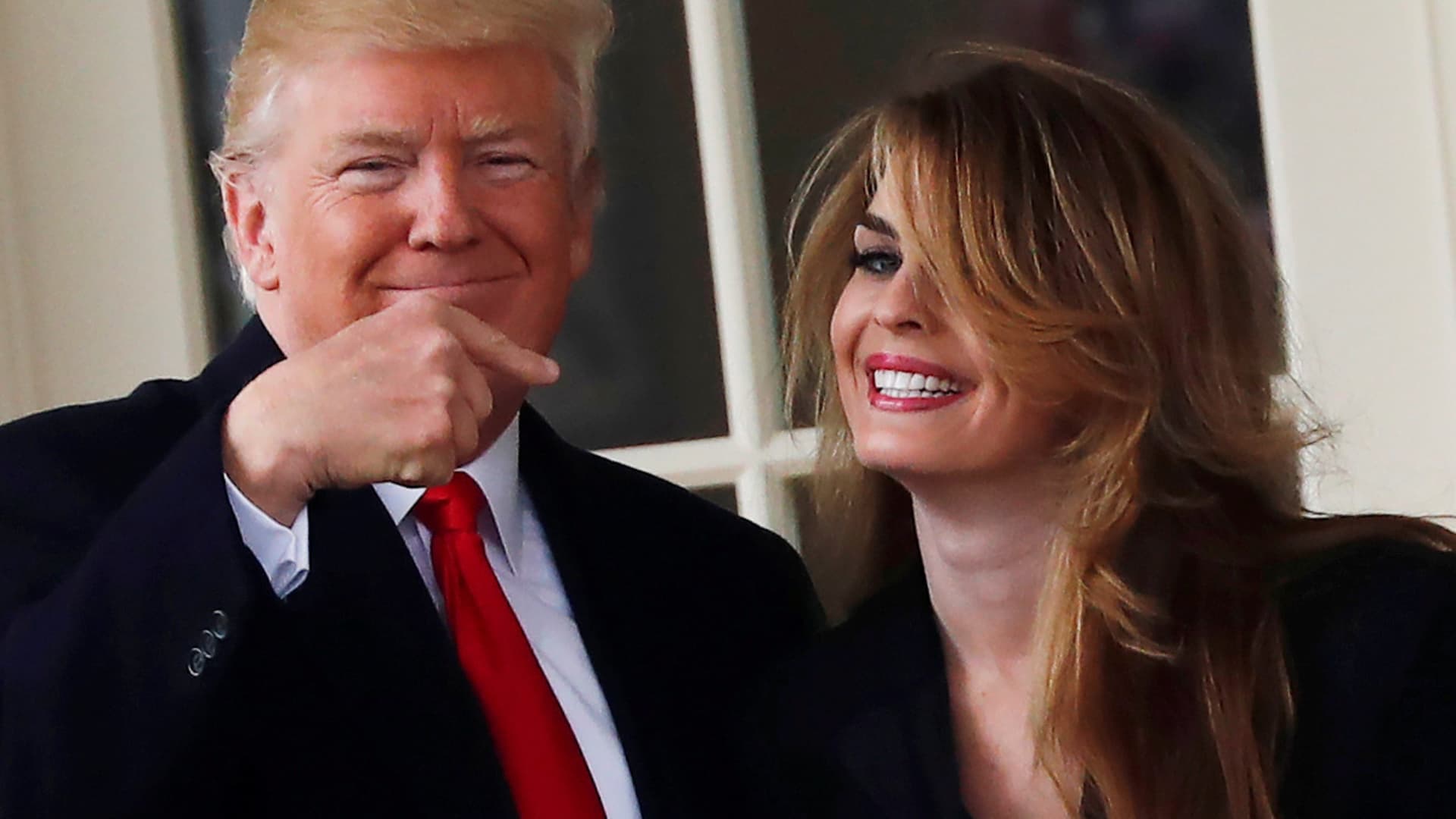Former top White House communications aide Hope Hicks started crying on the witness stand Friday as an attorney for Donald Trump began cross-examining her testimony in the ex-president’s criminal hush money trial.
Hicks and the jury briefly left the courtroom while she composed herself.
The emotional outburst came at the start of the defense attorneys’ time to question Hicks, who spoke just feet away from her former boss in Manhattan Supreme Court.
Prosecutors had asked Hicks about the infamous “Access Hollywood” tape that threatened Trump’s 2016 presidential campaign just weeks before Election Day.
“Everyone was just absorbing the shock of it,” Hicks testified.
Hicks, a top press aide for the campaign at the time, said she was “very concerned” when she received an email from The Washington Post on Oct. 7, 2016, seeking comment on the tape in which Trump is heard bragging about sexual misconduct.
Hicks was concerned “about the contents of the email” and about “the lack of time to respond,” she testified.
She said she notified other campaign leaders, including Jason Miller, David Bosse, Kellyanne Conway and Steve Bannon. She wrote that the initial strategy should be that they “need to hear the tape to be sure” and to “deny, deny, deny.”
When Trump read the transcript of the tape, he said, “That doesn’t sound like something I would say,” Hicks testified.
In a brief cross-examination, Hicks told Trump’s lawyer that she was not involved with the Trump Organization’s record-keeping practices while she was at the White House.
The tape is a significant piece of the case against Trump, who is charged with falsifying records as part of a scheme to silence damaging information about him ahead of the 2016 election.
Attorney Keith Davidson testified Tuesday that the tape spurred a swell of media interest in porn star Stormy Daniels’ claim that she had sex with Trump while he was married years earlier.
“I think before, before [the] ‘Access Hollywood’ tape, there was very little interest from what I understand,” said Davidson, who represented Daniels and helped broker a $130,000 hush money payment to her.
Hicks, 35, has deep roots in Trump’s business and political lives, and she was present for many of the scandals that defined Trump’s campaign and his term in office. She worked for the Trump Organization before being tapped in early 2015 as Trump’s campaign press secretary. Hicks worked for Trump over his four years in the White House.
Hicks, appearing in Manhattan Supreme Court under subpoena, testified that she has not spoken to Trump since the summer or fall of 2022.
Her testimony follows that of eight other witnesses including Davidson, who negotiated six-figure hush money deals for Daniels and former Playboy model Karen McDougal ahead of the 2016 presidential election.
Trump faces 34 counts of falsifying business records related to the payment to Daniels. Manhattan District Attorney Alvin Bragg accuses Trump of unlawfully trying to influence the election by buying and suppressing damaging information about him.
On Thursday, Judge Juan Merchan held a hearing on whether Trump violated the gag order again, barring him from speaking about jurors, witnesses and others involved in the trial.
Merchan had already held Trump in criminal contempt for violating his speech restrictions nine times. The judge fined Trump $9,000, the maximum, and warned him that future violations could land him in jail. Prosecutors in Thursday’s hearing flagged four more alleged gag order violations by Trump, though they said they were not seeking to put him in jail.
Merchan has yet to rule on the additional alleged violations.
Over two days of testimony, Davidson discussed his work with the National Enquirer and Trump’s then-lawyer Michael Cohen to craft the hush money deals, in the process shedding light on how tabloids operate in their hunt for lurid stories.
David Pecker, the former CEO of the Enquirer’s publisher, described his work in prior trial testimony as “checkbook journalism” and said he made deals with the understanding of trying to help Trump’s election chances.
On the night Trump won that election, Davidson texted the Enquirer’s then-editor-in-chief, “What have we done?”
He testified Thursday that the text was “sort of gallows humor.” But he added that he and the top editor, Dylan Howard, understood at the time that “our activities may have in some way assisted the presidential campaign of Donald Trump.”
On cross-examination, Trump’s attorney stressed that Davidson never met or spoke with Trump and that all his knowledge about the then-presidential candidate came secondhand.
After Davidson left the witness stand, prosecutors called Douglas Daus, a forensic analyst for Bragg’s office who detailed his findings from Cohen’s phone.
Jurors heard a recording of Trump saying asking Cohen, “So what do we got to pay for this — 150?” and instructing his lawyer to “pay with cash.” Pecker’s company at the time, American Media, paid McDougal $150,000 for the rights to her affair claim as part of an alleged “catch and kill” scheme to bury the story.





